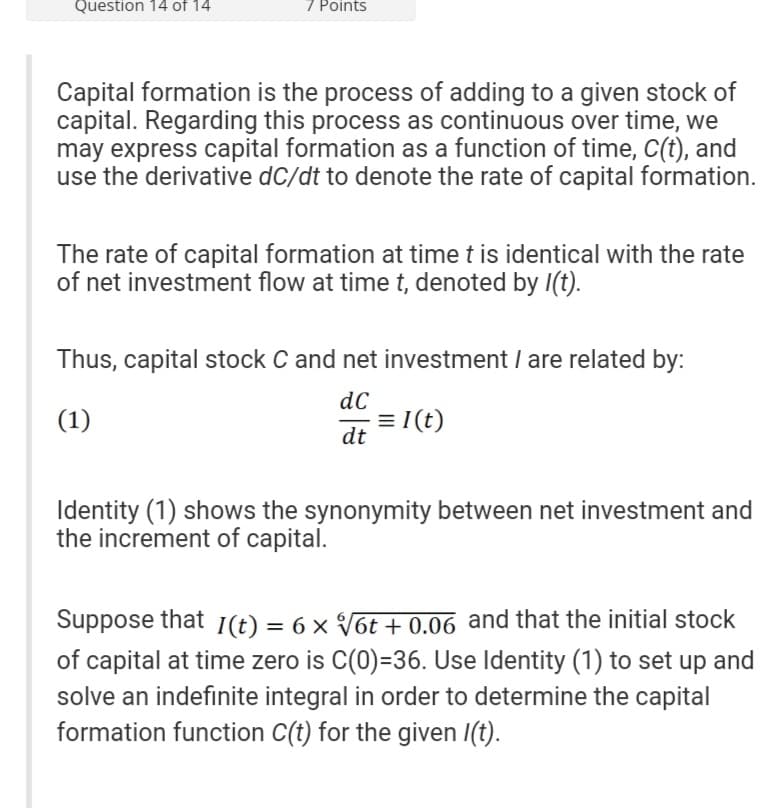Capital formation is the process of adding to a given stock of capital. Regarding this process as continuous over time, we may express capital formation as a function of time, C(t), and use the derivative dC/dt to denote the rate of capital formation. The rate of capital formation at time t is identical with the rate of net investment flow at time t, denoted by I(t). Thus, capital stock C and net investment / are related by: dC (1) = 1(t) dt Identity (1) shows the synonymity between net investment and the increment of capital. Suppose that 1(t) = 6 x √√6t+0.06 and that the initial stock of capital at time zero is C(0)=36. Use Identity (1) to set up and solve an indefinite integral in order to determine the capital formation function C(t) for the given l(t).
Capital formation is the process of adding to a given stock of capital. Regarding this process as continuous over time, we may express capital formation as a function of time, C(t), and use the derivative dC/dt to denote the rate of capital formation. The rate of capital formation at time t is identical with the rate of net investment flow at time t, denoted by I(t). Thus, capital stock C and net investment / are related by: dC (1) = 1(t) dt Identity (1) shows the synonymity between net investment and the increment of capital. Suppose that 1(t) = 6 x √√6t+0.06 and that the initial stock of capital at time zero is C(0)=36. Use Identity (1) to set up and solve an indefinite integral in order to determine the capital formation function C(t) for the given l(t).
Linear Algebra: A Modern Introduction
4th Edition
ISBN:9781285463247
Author:David Poole
Publisher:David Poole
Chapter6: Vector Spaces
Section6.7: Applications
Problem 16EQ
Related questions
Question

Transcribed Image Text:Question 14 of 14
7 Points
Capital formation is the process of adding to a given stock of
capital. Regarding this process as continuous over time, we
may express capital formation as a function of time, C(t), and
use the derivative dC/dt to denote the rate of capital formation.
The rate of capital formation at time t is identical with the rate
of net investment flow at time t, denoted by l(t).
Thus, capital stock C and net investment / are related by:
dC
(1)
= 1(t)
dt
Identity (1) shows the synonymity between net investment and
the increment of capital.
Suppose that 1(t) = 6 × √√6t + 0.06 and that the initial stock
of capital at time zero is C(0)=36. Use Identity (1) to set up and
solve an indefinite integral in order to determine the capital
formation function C(t) for the given /(t).
Expert Solution
This question has been solved!
Explore an expertly crafted, step-by-step solution for a thorough understanding of key concepts.
Step by step
Solved in 3 steps with 4 images

Recommended textbooks for you

Linear Algebra: A Modern Introduction
Algebra
ISBN:
9781285463247
Author:
David Poole
Publisher:
Cengage Learning


Algebra & Trigonometry with Analytic Geometry
Algebra
ISBN:
9781133382119
Author:
Swokowski
Publisher:
Cengage

Linear Algebra: A Modern Introduction
Algebra
ISBN:
9781285463247
Author:
David Poole
Publisher:
Cengage Learning


Algebra & Trigonometry with Analytic Geometry
Algebra
ISBN:
9781133382119
Author:
Swokowski
Publisher:
Cengage